Photographs: Joshua Roberts/Reuters Mike Peacock in London
The Federal Reserve's gradual exit plan from printing money has shifted the world's central bank landscape and thrown financial markets into a spin. The US central bank has pumped $85 billion a month into its economy but has now said it will slow that rate and maybe halt it by mid-2014.
The big worry for investors is that there is no playbook for stopping this unprecedented stimulus. In the coming week, the European Central Bank, Bank of England (featuring Mark Carney's debut as governor) and the central banks of Australia, Sweden, Poland and Romania all hold monetary policy meetings.
They offer a broad snapshot of the problems facing different countries. The ECB and its UK counterpart have made clear no policy shift is imminent, Australia's fate is closely tied to China where it exports vast amounts of raw materials, while Poland and Bulgaria are part of the emerging market world that has borne the brunt of recent volatility.
Following is a breakdown of how these central banks, and others, may act as thoughts turn tentatively to quitting years of extraordinary policy measures. The ECB, unlike the central banks of the United States, Japan and Britain, has not created money out of thin air and is expected to leave interest rates at a record low 0.5 per cent next week and for the rest of the year.
...
World central bank policymakers change gears
Image: Bank of England is illuminated against the night sky in the City of London.Photographs: Matt Dunham/Reuters
Perhaps its biggest concerns are the continuing reluctance of banks to lend in the weaker euro zone members and rising borrowing costs in those countries since the Fed upset the applecart. That brought to an end a 10-month trend of cheaper borrowing following the ECB's pledge to buy government bonds in potentially unlimited amounts to shore up the single currency, although yields remain well short of danger level.
It is not clear what the ECB can do. Bond-buying can only be triggered if a country requests help from the euro zone's rescue fund and there is no sign of that happening soon. There has been talk of cutting the deposit rate - which banks get for storing their money at the ECB - into negative territory to try and boost lending. But that rate is already at zero and has not prompted banks to help the wider economy.
If deflation loomed, the ECB's mandate would allow it to print money but again that looks unlikely. Another option would be an offer of cheap, long-term liquidity to banks similar to the more than 1 trillion euros handed over last year but there has been no hint of the ground being prepared for that.
...
World central bank policymakers change gears
Image: A worker on his bike rides past the Reserve Bank of Australia building in central Sydney.Photographs: Daniel Munoz/Reuters
The ECB has emphatically denied a report that it was considering launching a new bond purchase programme under which it would buy debt of all 17 euro zone countries. Britain's central bank holds a policy meeting on Thursday at which Canada's Mark Carney will make his debut as governor.
The Bank has already created 375 billion pounds of new money to buy government bonds and no more is expected to be sanctioned this time. A Reuters poll of economists gave a median 40 per cent chance that more pounds will be printed before the year-end.
There is no indication that it will begin to unwind that policy or raise interest rates in the foreseeable future, with rates expected to remain at a record low until at least 2015. The Bank has warned that banks and borrowers would be vulnerable to an abrupt rise in global interest rates which could require lenders to bolster their capital cushions again.
The Bank of Japan is heading in the opposite direction to the Fed. It stunned financial markets on April 4 by setting in motion an intense burst of monetary stimulus, promising to inject $1.4 trillion into the economy, doubling its bond holdings in two years and boost purchases of risky assets in an attempt to end years of deflation.
...
World central bank policymakers change gears
Image: Sweden's central bank in Stockholm.Photographs: Bob Strong/Reuters
Some experts have suggested the central bank may boost purchases of riskier assets, such as trust funds investing in stocks and property, if recent market turbulence persists and threatens economic recovery. A goal has been set of raising inflation to 2 per cent and the BOJ has predicted that would happen around the second quarter of 2015. Analysts doubt that will be achieved but either way, there is plenty more stimulus to come.
The People's Bank of China has put banks in the world's second largest economy on notice that it will tighten credit conditions but has also moved to calm a recent crunch which saw money market rates soar. The central bank wants to curtail funds flowing into China's vast "shadow" financial system that fuels property and stock speculation and push money into more productive areas of the economy to secure more sustained growth.
But its decision to let short-term borrowing costs soar to extraordinary levels last week fanned fears that a temporary squeeze could escalate into a lasting credit crunch despite the PBOC's strong track record in managing its financial sector. Australia's central bank last cut interest rates by a quarter-point to a record low of 2.75 per cent in May and the market had expected at least one more easing.
...
World central bank policymakers change gears
Image: A man walks in front of National Bank of Poland.Photographs: Kacper Pempel/Reuters
It said the Aussie dollar remained high despite a recent steep decline and saw scope for it to fall further, possibly diminishing the chances of another rate cut. The falling currency will help exports, so represents an implicit loosening of financial conditions for a country that escaped recession through the world financial crisis and is expected to grow by three percent or more next year.
But for Australia, an awful lot hangs on Chinese demand for raw materials. When the world, and then the euro zone, was in turmoil, money ran to safe havens such as Switzerland and Norway. While stock markets enjoyed strong gains after the European Central Bank's pledge to do whatever it takes to save the euro, the ructions caused by the Federal Reserve have investors pondering a flight to safety again.
The Swiss National Bank said last week it remained sufficiently concerned about the strength of the franc and the risks to its economy to stick to its cap on the currency, which has held firm for nearly two years. Norway has delayed plans to raise interest rates from 1.5 per cent until the end of 2014 - partly because of the strength of its currency - and now believes there is a 50-50 chance of a cut in September, despite previous concerns about overheating in parts of the economy and a housing bubble building up.
...
World central bank policymakers change gears
Image: Central headquarters of Banca Comerciala Romana in Bucharest, Romania.Photographs: Stringer/Reuters
Sweden also saw some investment inflows during the crisis. It is expected to keep rates at 1.0 per cent and delay plans for tighter policy well into next year. Around $8 trillion has flowed into emerging stock and bond markets since 2004.
The fear is that a chunk may now flow out. Next week, Poland is likely to cut interest rates for the last time in this cycle to 2.5 per cent. The zloty currency has been hurt by the recent market turbulence, giving policymakers pause for thought, but the economy is close to recession. Romania's central bank is expected to cut interest rates on Monday for the first time in more than a year as inflation is expected to slow.
Indonesia has already raised rates by a quarter point to 6 per cent in the face of pressure on the rupiah currency, which has slid alongside its Asian counterparts.
...
World central bank policymakers change gears
Image: A man walks towards the Bank of Japan building in Tokyo.Photographs: Yuriko Nakao/Reuters
India kept interest rates at 7.25 per cent, having cut at the previous three policy meetings, and warned of upward risks to inflation as the rupee is among the hardest hit in the global emerging markets sell-off. Brazil's central bank has been intervening to prop up its real currency and has also raised its inflation forecast, signalling a quicker pace of rate rises to come.
In Mexico, markets have priced out the chance of further rate cuts after a surprise decrease in March to 4 percent, as the Fed's stance may weaken the peso further and push up import prices.

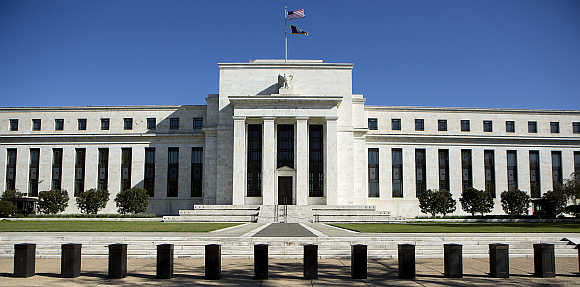
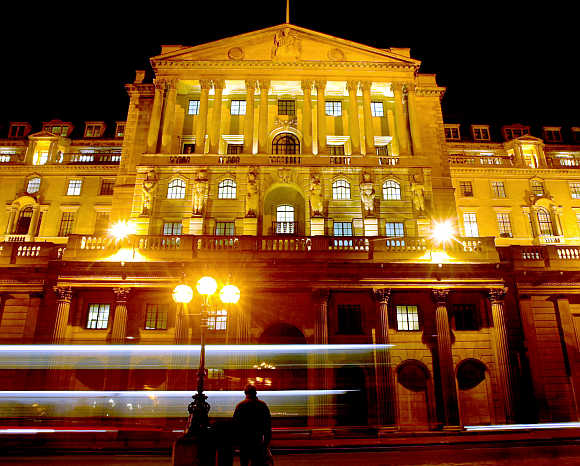
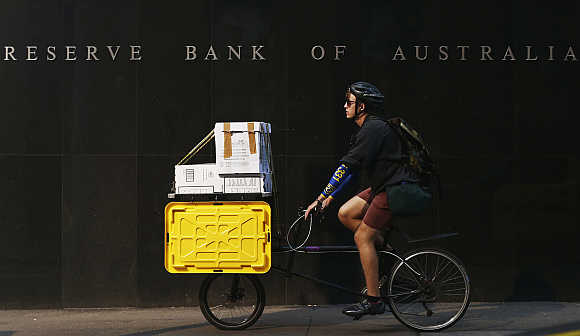
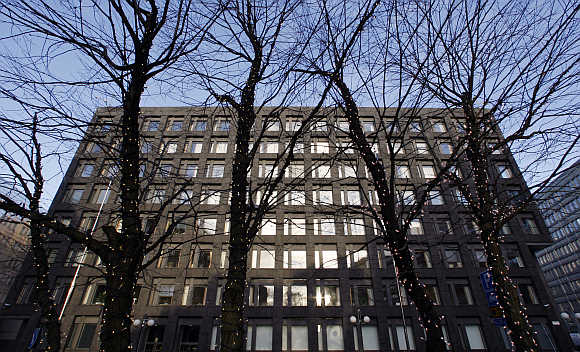
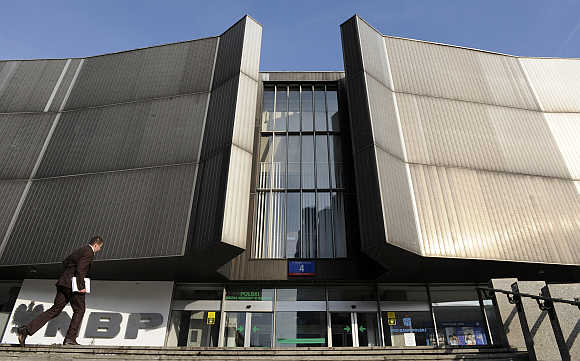
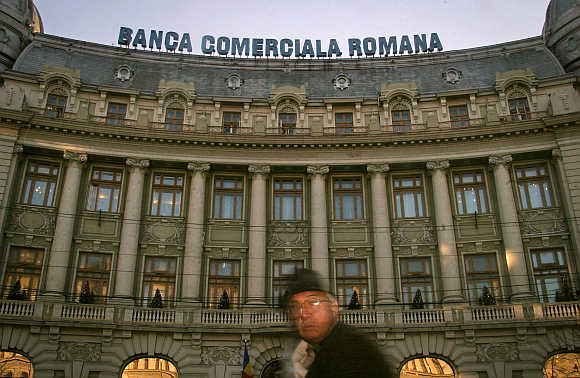
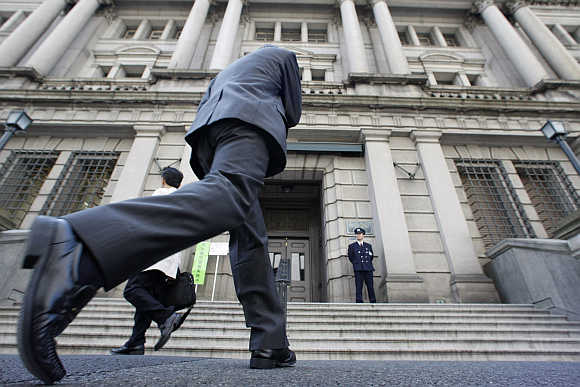

article